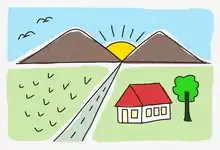
A drawing of twin mountains (Indonesian: pemandangan gunung kembar, "twin mountain view", or pemandangan gunung legendaris, "legendary mountain view") is a drawing pattern commonly made by Indonesian kindergarten and primary school students. The drawing is often produced by students who are asked by their teacher to draw natural features.[1]
The drawing is typically characterized by a road stretching between vast fields of rice that leads toward two mountains on the horizon, with the sun nestled in the space between the two peaks. Other objects commonly added by students include clouds, trees, grass (or paddy fields), people (or paddy farmers), a house (the farmer's),[2][3] and birds seen from afar. The significance of the drawing is to demonstrate the tendency of children to compose symmetrical scenes that consist of asymmetrical features, as well as a tendency to imitate their peers.[4][2]
History

The template for the drawing originates from Yogyakartan artist Tino Sidin, the host of the children's drawing program Gemar Menggambar, which aired on TVRI in the 1980s.
One of the drawings produced by Sidin contained the now iconic twin mountains and rice fields. Sidin's artwork proved to be so popular that Indonesian schoolchildren began to imitate the drawing, with teachers using his work as a reference for their students in the classroom.[5][6] Mount Sindoro and Mount Sumbing, located in Central Java, are sometimes cited as the real-life basis for the drawing.[7]
Criticism
Several critics have argued that the twin mountain drawing highlights issues in the educational system in Indonesia.
Indonesian teachers and schools are perceived as monotonous, as students almost unanimously decide to draw twin mountains, and critics argue this shows that schools do not promote diversity and creativity. Many believe that more action should be taken by teachers to promote creativity among their students.[8][3] The monotonous nature of schools also causes students to fear being different, forcing them to conform and draw the same imagery as their peers.[9]
The phenomenon also shows the dogmatic characteristics of Indonesian teachers, who are not open-minded to more creative choices made by students. Often, students are only allowed to follow the teacher's example, and critics argue that teachers should practice open-mindedness to allow students to produce imagery other than the twin mountains, when asked to draw natural features.[1]
See also
- Cool S, a similar phenomenon of a universally-drawn picture.
References
- 1 2 "Anak-anak yang Terpenjara di antara Dua Gunung :: SekolahSuper.com – Sekolahnya semua : orang tua, guru dan anak ." sekolahsuper.com (in Indonesian). Retrieved 2020-01-16.
- 1 2 Kurniawan, Franky (2011). "Studi tentang gambar berpola gunung kembar pada hasil karya anak / Franky Kurniawan". Studi tentang gambar berpola gunung kembar pada hasil karya anak / Franky Kurniawan (in Indonesian). 2011 (2011): 1–99.
- 1 2 Suwarna. 2008. Gejala-Gejala Karya Seni Lukis Anak-Anak TK dan Pembinaannya di Kecamatan Bantul. Universitas Negeri Yogyakarta, PDF
- ↑ Martono (2017). "Pembelajaran Seni Lukis Anak untuk Mengembangkan Imajinasi, Ekspresi, dan Apresiasi". Prosiding Seminar Nasional Pendidikan FKIP UNTIRTA (in Indonesian).
- ↑ Revitasari, Febriyanti. "Tahu Gak Kenapa Kita Selalu Menggambar Pemandangan yang Sama? Ini Jawabannya!". IDN Times (in Indonesian). Retrieved 2020-01-16.
- ↑ Loop. "Kenapa Anak Kecil Suka Menggambar Gunung? Begini Penjelasannya! | Loop.co.id". loop.co.id (in Indonesian). Retrieved 2020-01-16.
- ↑ Okezone (2017-03-30). "Gunung Kembar Legendaris Ternyata Aslinya Gunung Susi! : Okezone Nasional". Okezone (in Indonesian). Retrieved 2020-01-16.
- ↑ Sianturi, Riyanthi (2019-02-28). "Menggambar Pemandangan dan Kreativitas yang Tenggelam dalam Keseragaman". Medium (in Indonesian). Retrieved 2020-01-17.
- ↑ Fadila, Yogie (2014-12-31). "Karena Kita Semua Pernah Menggambar Dua Gunung dengan Sawah dan Matahari: Bagaimana Sekolah Membunuh Bakat Kreatif Kita". Hipwee (in Indonesian). Retrieved 2020-01-16.